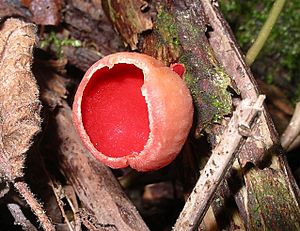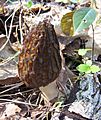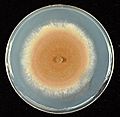Ascomycota facts for kids
Quick facts for kids Ascomycota |
|
|---|---|
 |
|
| Sarcoscypha coccinea | |
| Scientific classification | |
| Kingdom: | |
| Subkingdom: |
Dikarya
|
| Phylum: |
Ascomycota
(Berk 1857) Caval.-Sm. 1998
|
Ascomycota is a huge group of fungi often called the Sac Fungi. They get this name because they have a special sac-like part called an ascus. This ascus holds tiny spores, usually four or eight of them, which are like seeds for fungi. These spores help the fungi reproduce.
Contents
What Are Sac Fungi?
Sac fungi are a very diverse group. They can be found almost everywhere on Earth. You might be surprised by how many different kinds there are! Some are tiny, single-celled yeasts. Others are fuzzy molds. And some even grow into large, mushroom-like shapes.
Where Do Sac Fungi Live?
Sac fungi are super adaptable. They live in many different places. You can find them in the soil, in fresh water, and even in the ocean. They also grow on plants, animals, and even other fungi. Some live inside plants without causing harm. Others live on insects.
How Do Sac Fungi Grow?
Most sac fungi grow as tiny threads called hyphae. These threads spread out and absorb nutrients from their surroundings. When it's time to reproduce, they form the special sac-like ascus. Inside the ascus, spores develop. When the spores are ready, they are released. These spores can then grow into new fungi.
Types of Sac Fungi
This group includes many fungi you might already know. They play many different roles in nature and in our lives.
Yeasts
Yeasts are single-celled sac fungi. They are very important for humans.
- Baking: The yeast Saccharomyces cerevisiae helps make bread rise. It eats sugar and produces carbon dioxide gas, which creates bubbles in the dough.
- Brewing: This same yeast is also used to make alcoholic drinks like beer and wine. It turns sugars into alcohol.
Molds
Many common molds are also sac fungi. You might see them growing on old food.
- Penicillin: The famous antibiotic penicillin comes from a mold called Penicillium chrysogenum. This medicine helps fight bacterial infections.
- Cheese: Some molds, like Penicillium roqueforti and Penicillium camemberti, are used to make delicious cheeses. They give cheeses like Roquefort and Camembert their unique flavors and textures.
Mushrooms and Truffles
Not all fungi that look like mushrooms are sac fungi, but some very famous ones are.
- Morels: These fungi have a unique, honeycomb-like cap. They are highly prized by chefs and foragers.
- Truffles: Truffles grow underground, often near tree roots. They are very expensive and have a strong, earthy smell and taste. People often use specially trained dogs or pigs to find them.
Importance of Sac Fungi
Sac fungi are incredibly important for our planet and for people.
Nature's Recyclers
Many sac fungi are decomposers. This means they break down dead plants and animals. They help recycle nutrients back into the soil. This process is vital for healthy ecosystems. Without them, dead material would pile up, and new plants wouldn't have enough nutrients to grow.
Partners with Plants
Some sac fungi form special partnerships with plants.
- Lichens: A lichen is a partnership between a fungus (often a sac fungus) and an algae or cyanobacteria. The fungus provides protection, and the algae makes food through photosynthesis. Lichens can grow in harsh environments like rocks and tree bark.
- Mycorrhizae: Many sac fungi form connections with plant roots. This is called a mycorrhiza. The fungus helps the plant absorb water and nutrients from the soil. In return, the plant gives the fungus sugars it makes.
Plant Diseases
While many sac fungi are helpful, some can cause problems. They can cause diseases in plants, like powdery mildews, apple scab, and Dutch elm disease. These diseases can harm crops and trees.
Human Health
Some sac fungi can cause mild skin problems in humans, like athlete's foot or ringworm. However, many others are used to make important medicines, as mentioned with penicillin.
Images for kids
-
The ascocarp of a morel contains numerous apothecia.
See also
 In Spanish: Ascomyota para niños
In Spanish: Ascomyota para niños
 | Ernest Everett Just |
 | Mary Jackson |
 | Emmett Chappelle |
 | Marie Maynard Daly |






